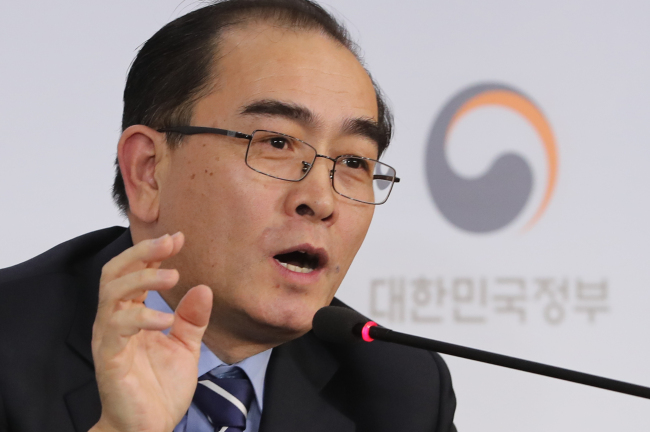North Korea aims to complete nuclear development by end-2017: ex-diplomat
By Shin Hyon-heePublished : Dec. 27, 2016 - 18:50
North Korean leader Kim Jong-un aims to complete the country’s development of nuclear weapons by the end of 2017 in time for leadership transitions in Seoul and Washington, a former North Korean diplomat said Tuesday.
Thae Yong-ho, who was the No. 2 official at Pyongyang’s Embassy in London, held his first news conference since Seoul revealed his arrival here in August. With the time frame, Kim is currently on the path toward nuclear development and will never abandon the program, even in return for 10 trillion won ($8.5 billion), he said.
Thae Yong-ho, who was the No. 2 official at Pyongyang’s Embassy in London, held his first news conference since Seoul revealed his arrival here in August. With the time frame, Kim is currently on the path toward nuclear development and will never abandon the program, even in return for 10 trillion won ($8.5 billion), he said.

“North Korea sees the end of 2017 as the best time on the calculation that the US and South Korea would be unable to take physical, military steps to halt its nuclear development because of their own internal political events, the presidential election and government transitions,” Thae said.
“How and whether to make Kim give up the nuclear program now is not about the incentive and its quality and quantity. As long as he rules, North Korea will never ever give up nuclear weapons even in return for $1 trillion or $10 trillion.”
Thae deems Kim’s parallel pursuit of nuclear and economic development -- known as the byongjin line -- to be a cover for its essential nuclear priority, saying the economic part was added only to “deceive” the people and the world.
After achieving bombs, the regime will likely attempt to restart talks with the new administrations in Seoul and Washington to acquire their recognition of the North as a nuclear state, he noted.
“From the North Korean point of view, there are two weak spots in the liberal democratic system. First, any new government in the US and the South, whether it is conservative or progressive, will try a fresh approach to the North, and second, with a government change, there will be a change in the people who drive the North Korea policy,” Thae said.
“With the incoming governments, the North will seek to be accepted as a nuclear state, proposing a moratorium in the nuclear program in exchange for a lifting of sanctions and a freeze of South Korea-US joint military drills.”
Thae, who served in countries including Denmark and Sweden, harbored the desire to flee to the affluent, democratic South while accessing outside information relatively freely as a diplomat.
He was adamant that the Kim dynasty has “no future” and that its instability will only deepen in the face of the young ruler’s unabated reign of terror, international sanctions and the influx of South Korean culture.
“The Kim regime may look solid on the surface but it’s decaying inside,” Thae said.
“Many North Korean people including the elites like myself are living an opportunistic life -- they chant hail to Kim Jong-un during the daytime and watch South Korean films and dramas at night, under blankets.”
He also called for fellow countrymen to escape the oppressive homeland and lauded other defectors as “unification fighters and slave liberators,” vowing to work for the two nations’ reintegration.
“North Koreans, Kim Jong-un will collapse like a wet wall when you stand up and protest against him,” he said. “Let’s live freely in a unified country, not live in fears. … It’s your chance to proudly tell your children in the future that you cut the chain of slavery.”
By Shin Hyon-hee (heeshin@heraldcorp.com)








![[Hello India] Hyundai Motor vows to boost 'clean mobility' in India](http://res.heraldm.com/phpwas/restmb_idxmake.php?idx=644&simg=/content/image/2024/04/25/20240425050672_0.jpg&u=)









